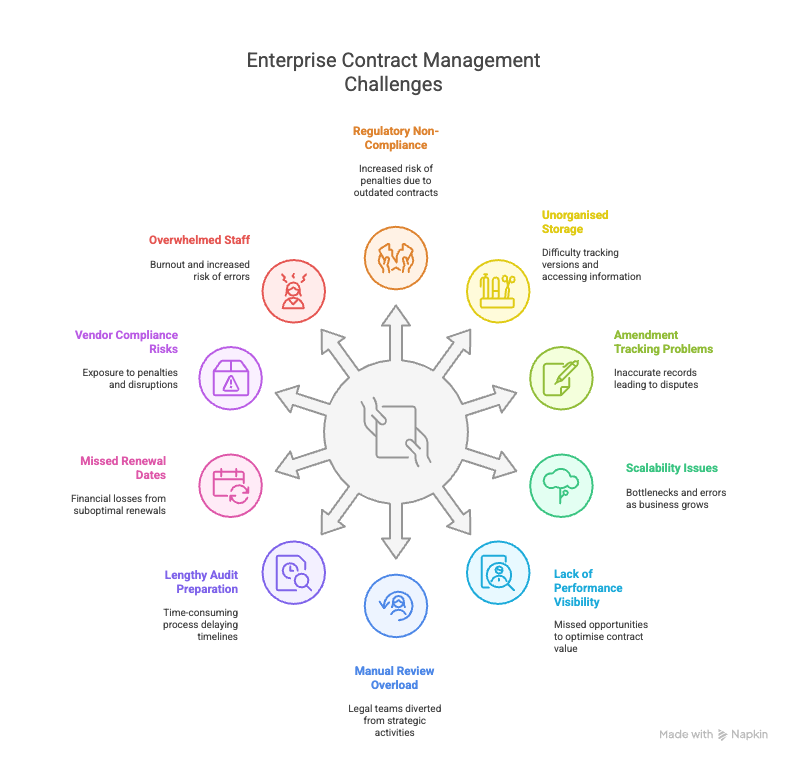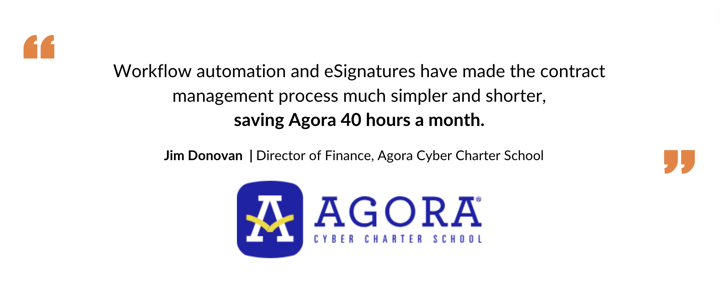Enterprise organisations in highly regulated sectors, such as finance, healthcare, and energy, are under relentless pressure to balance growth with ever-tightening compliance mandates.
Yet, according to Secureframe’s 2024 report, only 50% of compliance programs are fully mature, leaving half of all enterprises vulnerable to costly oversights and data breaches.
In this article, we’ll explore why enterprise contract management software is the linchpin for modern regulated organisations.
You’ll learn how the right solution not only shores up compliance and data security but also accelerates negotiations, amplifies visibility, and frees up legal and procurement teams to focus on high-value strategic work.
What is enterprise contract management software?
Enterprise contract management software is a sophisticated suite of tools designed to help large organisations streamline and automate the entire lifecycle of contracts, from request through to renewal or termination.
It provides the control, visibility and efficiency needed to automate manual work, mitigate risks and optimise contract value.
Who Needs Enterprise Contract Management Software?
Enterprise contract lifecycle management (CLM) software is crucial for any organisation grappling with:
- Complex contract terms: Intricate contracts with varying clauses, obligations and renewal terms necessitate a robust system to ensure accuracy and compliance.
- Decentralised contract management: When contracts are managed across different departments or locations, it can easily lead to a lack of visibility and control, making a centralised solution essential.
- High contract volume: Organisations dealing with hundreds or thousands of contracts annually require a system to efficiently manage and track these agreements.
- Stringent compliance requirements: Organisations with strict regulatory requirements, such as those in healthcare or finance, need enterprise contract management software to ensure adherence to legal and industry-specific obligations particularly when operating across multiple legal jurisdictions.
While legal and procurement teams are primary users, the benefits of enterprise CLM software extend across various departments, including sales, finance, operations, risk, compliance and IT.
Signs Your Enterprise Needs a Contract Management Solution
Enterprises often encounter a range of challenges that signal the urgent need for a more robust contract management solution than might be currently in use.

These signs indicate that current software and processes are inefficient and/or unsustainable, and may be significantly hindering business operations and growth. Signs include:
- Challenges in maintaining regulatory compliance: Ever-changing regulations can require organisations to update their contract templates and processes frequently. Without a centralised system, ensuring that all contracts comply with the latest regulations is a significant challenge, increasing the risk of non-compliance penalties.
- Contracts stored in inboxes or shared drives: When contracts are scattered across various inboxes and shared drives, it leads to a lack of contract visibility, making it difficult to track versions, access critical information quickly, and ensure that all stakeholders are working with the latest documents. This disorganisation increases the risk of errors, delays and miscommunication, and makes reporting and auditing incredibly complex.
- Difficulty managing contract amendments and variations: As business needs evolve, contracts frequently require amendments and variations. Without a robust system to track these changes, it becomes difficult to maintain an accurate record of the current contractual obligations, increasing the risk of disputes and non-compliance.
- Inability to scale with business growth: Existing contract management methods, whether spreadsheets, shared drives or basic software, often struggle to scale as the business grows and contract volume increases. This leads to bottlenecks, errors and increased risk, hindering the organisation's ability to efficiently manage its expanding contractual obligations.
- Lack of visibility into contract performance: Many organisations lack a clear view of contract performance, making it difficult to identify areas for improvement or to ensure that contractual obligations are being met. This lack of visibility hinders effective contract management and can lead to missed opportunities to optimise contract value.
- Legal teams wasting hours on manual reviews: Legal teams often spend excessive time on manual contract reviews, identifying risks, and ensuring compliance. This manual effort diverts their attention from more strategic activities, slows down the contract cycle, and increases operational costs. It also leads to potential bottlenecks and delays in closing deals.
- Lengthy audit preparation: When contract information is not centrally stored and easily accessible, preparing for audits can be a time-consuming and resource-intensive process. Gathering the necessary documents and ensuring accuracy can take days, increasing stress and potentially delaying audit timelines. This also increases the risk of non-compliance penalties if information is not readily available.
- Missed renewal dates causing financial loss: Failing to track contract renewal dates can result in missed opportunities to renegotiate better terms or terminate unfavourable agreements. This oversight can lead to automatic renewals at suboptimal rates, resulting in unnecessary financial losses and reduced profitability. It also hinders effective financial forecasting and budgeting.
- Vendor compliance risks are hard to track: Inadequate tracking of vendor compliance can expose organisations to significant risks, including legal penalties, reputational damage and supply chain disruptions. Without a centralised system to monitor vendor obligations and performance, it's challenging to ensure that vendors meet contractual requirements and regulatory standards. This lack of oversight can lead to costly disputes and business disruptions.
- Workload overwhelming contract management staff: The sheer volume of contracts, combined with increasing complexity and the need for rapid turnaround, can overwhelm contract management and legal teams. This can result in burnout, decreased productivity, and an increased risk of errors due to overworked staff.
These symptoms collectively highlight the critical need for a centralised, automated and scalable contract management solution to improve visibility, reduce errors, mitigate risks and support business growth.
Implementing an enterprise contract management solution, such as Gatekeeper, can transform these pain points into streamlined, efficient and strategic contract management practices.
Benefits of Enterprise Contract Management Software
Enterprise CLM software offers numerous benefits that can significantly improve any large organisation's efficiency, reduce risks, and enhance overall contract management outcomes. Here are some key advantages:
- Empower Smarter Procurement Decisions: Give procurement teams the power to make smarter decisions with real-time visibility into contract value, spend trends, and risk exposure.
- Enhance Compliance Confidence: Provide enhanced compliance confidence through continuous vendor risk monitoring.
- Free Up Legal Teams for Strategic Work: Allow legal teams to focus on strategic work by using AI contract summaries to reduce manual review time and surface risk instantly.
- Prevent Revenue Leakage: Enable organisations to never miss a renewal or auto-renewal with proactive alerts and timeline tracking.
- Streamline Stakeholder Collaboration: Help streamline stakeholder collaboration with custom workflows that remove bottlenecks and speed up approvals.
Enterprise CLM software offers AI capabilities to help businesses make faster, smarter decisions with AI contract summaries and proactively mitigate risk with always-on monitoring.
Key Features to Look For in Enterprise CLM Software
When considering enterprise contract management software, it's essential to evaluate several key features that can address specific business needs and improve contract management processes, such as:
- AI-Powered Data Extraction and Contract Summaries to Accelerate Reviews: These summaries can significantly reduce the time legal teams spend on manual reviews. By quickly summarising key contract details and surfacing potential risks, AI enables faster, more informed decision-making. Gatekeeper's OpenAI integration is a key differentiator in this area.
- Central Repository & Version Control for Total Visibility: A central repository with version control provides a single source of truth for all contracts, ensuring that everyone is working with the most current version. This feature enhances visibility, reduces confusion, and improves collaboration across teams.
- Best Practice Workflows to Eliminate Bottlenecks: Customisable workflows automate contract processes, removing bottlenecks and speeding up approvals. These workflows ensure that contracts move efficiently through the organisation, reducing delays and improving overall productivity. Gatekeeper’s customisable workflows are designed to meet the unique needs of each enterprise.
- Continuous Vendor Risk Monitoring to Reduce Exposure: Continuous vendor risk monitoring helps organisations stay on top of potential risks throughout the contract lifecycle. By providing real-time insights into vendor compliance and performance, this feature enables proactive risk management and reduces exposure. Gatekeeper’s Market IQ is a valuable tool for continuous vendor risk monitoring.
- Seamless Integrations to Unify Data Across Your Tech Stack: Seamless integrations with other enterprise systems, such as NetSuite and ERP platforms, unify contract data across the tech stack. This unified view provides valuable insights, improves data accuracy, and streamlines processes.

How to Choose the Right Enterprise CLM Software
Choosing the right enterprise CLM software is a critical decision that requires careful consideration of several factors to ensure it aligns with your organisation's specific needs. Here are some key criteria to evaluate:
- In-house implementation & onboarding support: Robust implementation and onboarding support are crucial to ensure a smooth transition and quick adoption of the new CLM system. Comprehensive support minimises disruption to existing workflows and helps users maximise the software's capabilities from the outset.
- Intuitive, user-friendly interface: An intuitive and user-friendly interface is essential to drive user adoption and minimise the learning curve. When the software is easy to navigate and use, it encourages consistent usage across the organisation, leading to better data accuracy and process efficiency.
- Continuous product innovation: The CLM software market is constantly evolving, so it's important to choose a vendor that demonstrates a commitment to continuous product innovation. Regular updates and new features ensure that the software remains relevant and can adapt to changing business needs and technological advancements.
- Security credentials: Security credentials such as SOC and ISO certifications are vital to ensure that the CLM software meets industry standards for data protection and security. These certifications provide assurance that sensitive contract information is handled with the utmost care and in compliance with relevant regulations.
- Integration capabilities: Seamless integration with other enterprise systems, such as NetSuite and other platforms, is crucial for data consistency and process automation. Integration eliminates data silos, improves data accuracy, and streamlines workflows across different departments.
- Vendor partnership approach: A vendor that adopts a partnership approach is more likely to provide ongoing support, listen to customer feedback, and work collaboratively to address specific business challenges. This collaborative relationship fosters a long-term, mutually beneficial partnership.
Selecting the appropriate enterprise CLM software involves assessing not only its current feature set but also the vendor's commitment to support, innovation, and security standards that protect and grow your organisation’s return on investment in the software.
Why Enterprises Choose Gatekeeper
Enterprises choose Gatekeeper for its ability to deliver on the core value propositions of contract management and its commitment to customer success.
- Trusted by global legal and procurement teams: Gatekeeper has earned the trust of legal and procurement customers worldwide by providing a reliable and effective solution that addresses their specific needs. This trust is built on a track record of delivering value and consistently meeting customer expectations.
- Proven implementation success: Gatekeeper has a strong track record of successful implementations, ensuring that organisations can quickly and smoothly transition to the new system. This proven success minimises disruption and accelerates the time to value.
- Commitment to customer-led innovation: Gatekeeper is committed to actively seeking and incorporating customer feedback to enhance its product. This focus on customer needs ensures that the software remains aligned with evolving business requirements.
- AI that works with your team, not instead of them: Gatekeeper's AI capabilities are designed to augment human expertise, providing valuable insights and automating routine tasks without replacing the need for human judgment. This collaborative approach empowers teams to work more efficiently and effectively.
- Built-in tools to engage vendors and scale governance: With features like the Vendor Portal, Gatekeeper makes it easy for vendors to self-serve onboarding, submit compliance documents, and manage updates, all from a centralised interface. Paired with enterprise-grade CLM, it enables organisations to manage the full lifecycle of both vendors and contracts from a single source of truth.
How Gatekeeper Helped Exscientia’s Legal Team Move from Inbox to Impact
As Exscientia scaled rapidly and prepared for IPO, their VP of Legal, Dan, found his small team drowning in contract admin, managing NDAs, templates, and negotiations via email, Google Drive, and Excel.
Tasked with finding an AI-powered contract management solution rather than adding headcount, Dan evaluated five top platforms and chose Gatekeeper for its usability, company-wide scalability, and unique pricing model.
Its seamless DocuSign and NetSuite integrations, combined with an outstanding implementation experience, sealed the deal.
The Results
- NDA admin time cut to near-zero
- Contract negotiation time halved
- 3+ hours saved per week for the legal team
- 15% increase in base NDA acceptance
- Legal team now contributes to strategic and board-level initiatives
“We have way fewer touchpoints now. Negotiation time has been halved, and administrative time has been almost entirely eliminated.” — Dan Ireland, VP of Legal, Exscientia
Wrap Up
Every day you delay adopting a dedicated enterprise CLM platform is another day your business is exposed to missed renewal windows that bleed revenue, siloed approvals that stall critical projects, and ever-growing regulatory fines that can top millions of pounds overnight.
A single audit finding can derail strategic initiatives. Now is the moment to act: implement a scalable enterprise CLM solution today to lock down compliance, improve processes, and turn your contracts into one of your strongest competitive advantages.
The clock is ticking, and the cost of inaction will only grow. Don’t wait for the next breach or audit; make enterprise CLM your priority now.
Book a demo.
enterprise Contract Management FAQs
1. What’s the difference between enterprise CLM software and basic contract management tools?
Enterprise CLM software is designed for scalability, automation, and compliance in large, complex organisations. It goes far beyond storing contracts. It supports workflow automation, AI-powered risk detection, vendor compliance tracking, audit readiness, and seamless integrations across enterprise systems. Basic tools often lack this depth, making them insufficient for regulated sectors.
2. Can Gatekeeper integrate with our existing ERP, CRM, and finance systems?
Yes. Gatekeeper integrates with systems like NetSuite, Salesforce, SAP, Workday, and more. Seamless integration ensures consistent data across departments, reduces manual data entry, and streamlines workflows end-to-end.
4. Is Gatekeeper secure enough for our industry’s compliance standards?
Absolutely. Gatekeeper maintains SOC 2 Type II, ISO 27001, and other critical certifications. It provides role-based access controls, audit trails, and data encryption, helping regulated industries stay compliant with GDPR, HIPAA, and other frameworks.
5. What kind of AI capabilities does Gatekeeper offer?
Gatekeeper uses OpenAI-powered features like contract summaries, risk surfacing, and automated clause extraction. These tools reduce review time for legal teams and help procurement and finance teams make faster, smarter decisions - all while keeping human oversight in place.
6. Who typically uses enterprise CLM software inside an organisation?
While Legal and Procurement teams are primary users, enterprise CLM supports Compliance, Finance, IT, Operations, Risk, and Sales functions. With the right user permissions and workflows, the platform becomes a single source of truth for all stakeholders.
7. What are the top compliance risks of not using an enterprise CLM?
Without a robust system, you risk:
- Missed renewal deadlines and revenue leakage
- Audit delays and regulatory fines
- Non-compliant vendor behaviour
- Loss of contract versions or obligations buried in email threads
- Manual errors that lead to disputes or operational failures
8. How does Gatekeeper support vendor management alongside contract management?
Gatekeeper combines contract lifecycle management with vendor lifecycle management. Features like the Vendor Portal allow vendors to self-manage onboarding, compliance documents, and updates, reducing internal admin and strengthening governance.



.png)
.png)
.png)
-4.png)